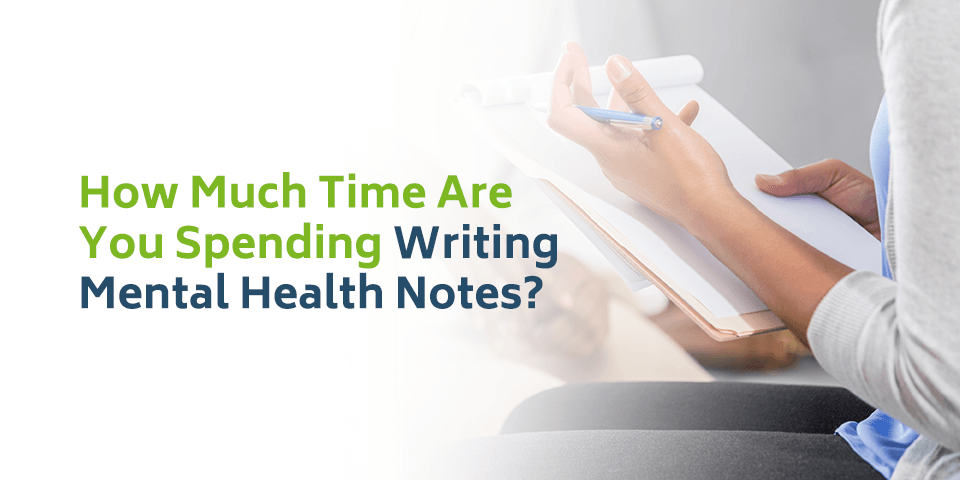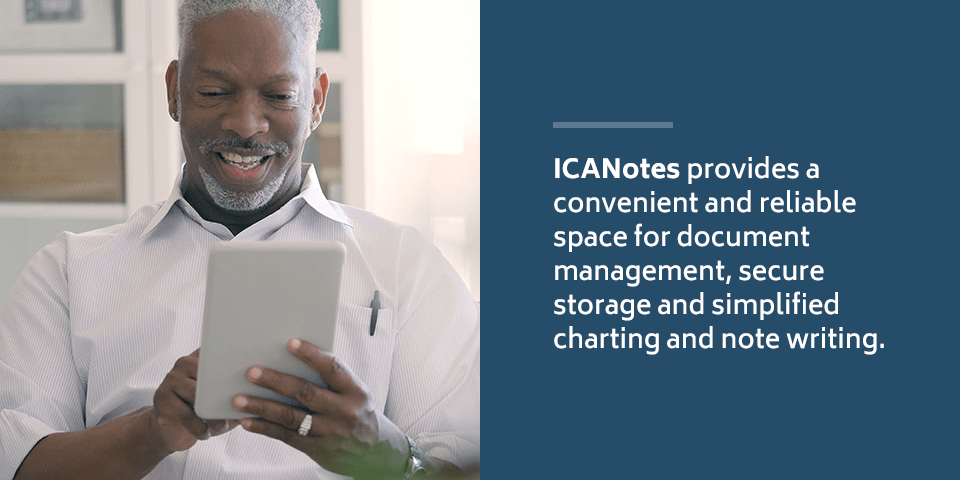How Much Time Are You Spending Writing Mental Health Notes?
Due to back-to-back appointments where healthcare professionals are trying to play catch-up, writing mental health notes has become a challenge. Because most professional ethic codes, licensing boards and state laws require notes to be taken during appointments, it's essential to know just how much time should be spent on writing notes. After all, spending too much time on notes can be as detrimental as not writing them at all.
Learn the effects of spending too much time on writing and what you can do to get your time back.
Table of Contents
- How Much Time Are Mental Health Professionals Really Spending on Note Writing?
- The Effects of Long Note Writing Times
- What Is the Fastest Way to Write Therapy Notes?
- Other Ways to Take Control of Your Note Writing Time
- Quick and Easy Note Writing With ICANotes
How Much Time Are Mental Health Professionals Really Spending on Note Writing?
Most mental health professionals spend long periods of time writing notes for their sessions. In a study of nearly 500 mental health professionals, 22% of the participants said they spend over 10 minutes writing each note — some specified they often take 15-30 minutes per note. On average, respondents spend 10 minutes on each note and see 18 clients per week. Ideally, mental health professionals should be able to complete their note writing in five minutes or less.
It should also be noted that taking work home in the evenings has become a common practice for many mental health professionals as they try to catch up on past appointments. In the same study, over 10% of respondents admitted they take their notes home after work to try and finish them. This habit can lead to even more time spent on notes as home-life distractions can often be interruptive.
The sheer volume of clients that mental health professionals see weekly or monthly can make it difficult to keep up with note writing. A slew of back-to-back appointments leaves little time for post-session note writing. Additionally, other meetings can arise, requiring your immediate attention. When it takes behavioral health clinicians 15-30 minutes to write notes, it's easy to see how quickly note writing can get backed up.
The Effects of Long Note Writing Times
Unfortunately, lengthy note writing times can have negative effects on you, your practice and your clients:
- Job dissatisfaction and burnout: Completing paperwork like note writing can lead to burnout among mental health professionals. You may feel that spending most of your time at work taking care of notes doesn't align with the job duties you envisioned. This situation can lead to job dissatisfaction and higher turnover rates among staff.
- Less availability for appointments: Some mental health professionals find it helpful to schedule out specific times daily or weekly for note writing. While this trick can be effective, you'll have less availability for client appointments if you spend high amounts of time on paperwork. That's an inconvenience for clients with limited schedules who are looking for appointments at specific times.
- Less time with clients: Similarly, long note writing times can result in the need to cut sessions short. This practice is unfair to both you and your clients — your primary goal is to help your clients, and they rely on you for help. As a result, the less time you have for your clients, the less help you'll be able to give and the less help they'll receive.
- Higher rate of no-shows, cancellations and disengagement: If your focus is on taking detailed notes during your sessions, it can lead to disengagement from you and your client. Trying to write down important details can be distracting. Therefore, your client will likely sense that you're disengaged or feel uncomfortable watching you take diligent notes. Although you have their best interest in mind, you may end up turning clients away.
What Is the Fastest Way to Write Therapy Notes?
The fastest way to write mental health notes and charts is with electronic health record (EHR) software and systems. As technology advances, electronic note writing has become increasingly popular as a way for mental health professionals to save time. ICANotes provides a convenient and reliable space for document management, secure storage and simplified charting and note writing. Templates make the process organized so your notes are a click away and easy to read.
Other Ways to Take Control of Your Note Writing Time
Consider these additional tips to help reduce the time it takes to write mental health notes:
1. Keep Legible and Concise Notes
Of course, creating legible notes is extremely important, as those notes help you provide the best care possible for your clients. Additionally, you may end up sharing your notes with other clinicians, and they need to be able to read them clearly. If you ever look back on your notes and aren't sure what they say, that's an issue.
Be sure to keep your notes concise while providing enough detail according to the situation. As a result, your writing will be more legible, helping you and others down the line. Furthermore, you'll be able to save time, which is essential for both you and your clients.
2. Leave Out Identifiable Details Related to Others
It's best to leave out details like names or quotes from a third party if the details regarding them aren't crucial to the client's records. These details are time-consuming — and identifiable details can violate one's privacy in the event your notes are subpoenaed or other clinicians or lawyers need to read them. Leaving out these specifics helps to protect you against standards and protects the privacy of others.
3. Organize Your Notes After the Session
During a session or appointment, information can be presented out of order, requiring mental health professionals to piece together a puzzle. Try to guide the conversation to stay organized and limit confusion. Take a few extra minutes right after a session to organize your notes in a logical order. This way, everything is still fresh in your mind, and you can efficiently write the most effective notes.
Quick and Easy Note Writing With ICANotes
EHR software can be extremely helpful in creating legible, organized notes. ICANotes helps behavioral health professionals take quality notes in less time. Even though note writing may be one of the least popular aspects of behavioral healthcare, ICANotes uses customizable buttons and note templates to make note writing more efficient. Our EHR system is compliant with HIPAA and other laws and regulations to protect your clients and your practice.
If you're looking for a way to reduce your documentation time, request a free trial of ICANotes. For more information about how ICANotes can make note writing easier for you, contact our support team today.
Related Posts
Handwritten Therapy Notes Cost You Time: Here’s What to Do
SOAP Note Mistakes to Avoid
How to Make Your Therapy Note Writing Process More Efficient
Tips for Writing Better Mental Health SOAP Notes



